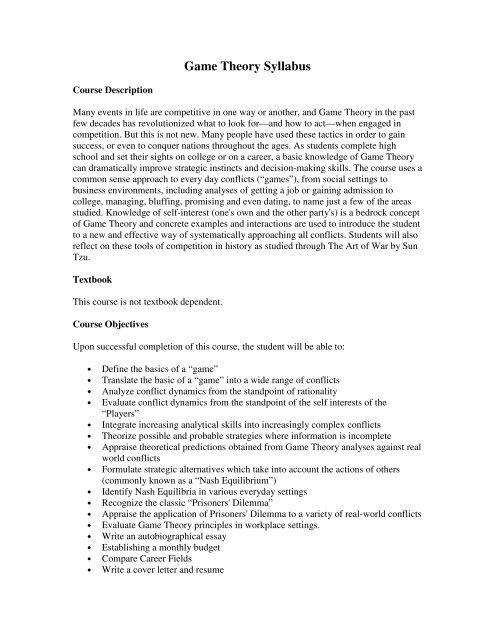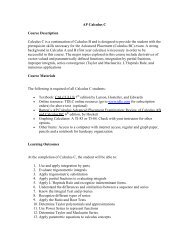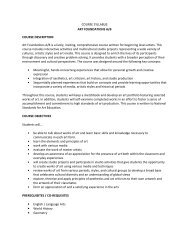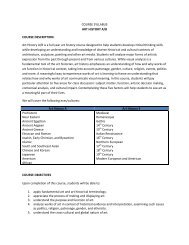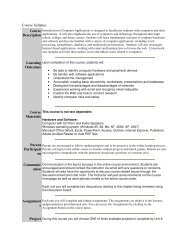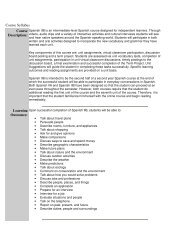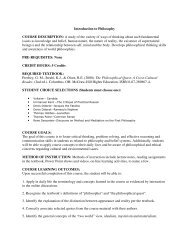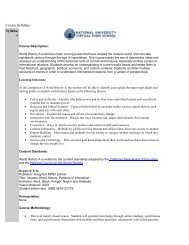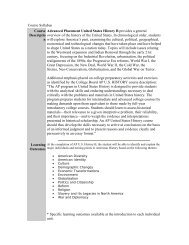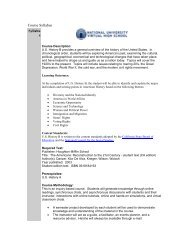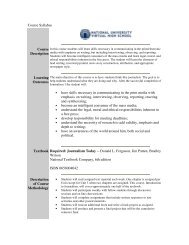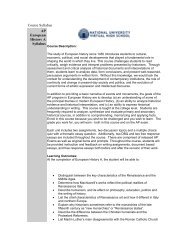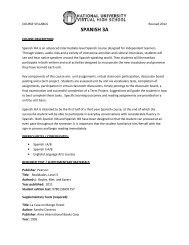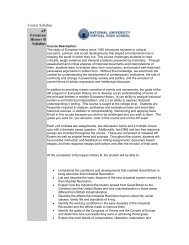Game Theory Syllabus - National University Virtual High School
Game Theory Syllabus - National University Virtual High School
Game Theory Syllabus - National University Virtual High School
Create successful ePaper yourself
Turn your PDF publications into a flip-book with our unique Google optimized e-Paper software.
<strong>Game</strong> <strong>Theory</strong> <strong>Syllabus</strong><br />
Course Description<br />
Many events in life are competitive in one way or another, and <strong>Game</strong> <strong>Theory</strong> in the past<br />
few decades has revolutionized what to look for—and how to act—when engaged in<br />
competition. But this is not new. Many people have used these tactics in order to gain<br />
success, or even to conquer nations throughout the ages. As students complete high<br />
school and set their sights on college or on a career, a basic knowledge of <strong>Game</strong> <strong>Theory</strong><br />
can dramatically improve strategic instincts and decision-making skills. The course uses a<br />
common sense approach to every day conflicts (“games”), from social settings to<br />
business environments, including analyses of getting a job or gaining admission to<br />
college, managing, bluffing, promising and even dating, to name just a few of the areas<br />
studied. Knowledge of self-interest (one's own and the other party's) is a bedrock concept<br />
of <strong>Game</strong> <strong>Theory</strong> and concrete examples and interactions are used to introduce the student<br />
to a new and effective way of systematically approaching all conflicts. Students will also<br />
reflect on these tools of competition in history as studied through The Art of War by Sun<br />
Tzu.<br />
Textbook<br />
This course is not textbook dependent.<br />
Course Objectives<br />
Upon successful completion of this course, the student will be able to:<br />
• Define the basics of a “game”<br />
• Translate the basic of a “game” into a wide range of conflicts<br />
• Analyze conflict dynamics from the standpoint of rationality<br />
• Evaluate conflict dynamics from the standpoint of the self interests of the<br />
“Players”<br />
• Integrate increasing analytical skills into increasingly complex conflicts<br />
• Theorize possible and probable strategies where information is incomplete<br />
• Appraise theoretical predictions obtained from <strong>Game</strong> <strong>Theory</strong> analyses against real<br />
world conflicts<br />
• Formulate strategic alternatives which take into account the actions of others<br />
(commonly known as a “Nash Equilibrium”)<br />
• Identify Nash Equilibria in various everyday settings<br />
• Recognize the classic “Prisoners' Dilemma”<br />
• Appraise the application of Prisoners' Dilemma to a variety of real-world conflicts<br />
• Evaluate <strong>Game</strong> <strong>Theory</strong> principles in workplace settings.<br />
• Write an autobiographical essay<br />
• Establishing a monthly budget<br />
• Compare Career Fields<br />
• Write a cover letter and resume
• Apply to College<br />
• Apply for Grants and Scholarships<br />
• Fill out a job application<br />
• Give a successful interview<br />
• Look for good financial investments<br />
Course Outline<br />
Unit<br />
Learning Outcomes<br />
• Pre-Test<br />
Activities<br />
Lecture: <strong>Game</strong> <strong>Theory</strong> Basics<br />
• Assignment: Analyzing Conflict<br />
Lecture: Being a Warrior When it Comes to Your Future<br />
Presentation: Introduction to General Tzu<br />
Lecture: The Art of War: Plan of Attack<br />
Reading Selection: The Art of War Part I: "Laying Plans"<br />
1 <strong>Game</strong> <strong>Theory</strong> Basics<br />
• Assignment: Applications--What Are Your Plans After <strong>High</strong><br />
<strong>School</strong>?<br />
• Assignment: Writing an Autobiographical Essay<br />
Discussion<br />
• Establishing Goals<br />
• Identifying Challenges<br />
Conversations with the General:<br />
• Danger / Opportunity<br />
• Assessing the Situation<br />
Unit 1 Quiz<br />
Project: (Choose One)<br />
• Home Run<br />
• Famous Generals Throughout Time
• Create Your Own <strong>Game</strong><br />
Learning Outcomes<br />
• Pre-Test<br />
Lecture: Price Competitions<br />
• Assignment: Comparing Prices<br />
• Apply: Identifying Bizarre Security Situations<br />
Discussion: Price Fixing<br />
Lecture: The Art of War: Assessing Cost<br />
Reading Selection: The Art of War Part II: "Waging War"<br />
2 Price Competition<br />
• Assignment: How Much Will Attaining Your Goals Cost<br />
You?<br />
• Assignment: Creating a Monthly Budget<br />
Conversations with the General:<br />
• Multiple Opportunities<br />
• Planning Insures Victory<br />
• Weigh Costs Before You Plan an Attack<br />
Unit 2 Quiz<br />
Project:<br />
• Task Definition<br />
Learning Outcomes<br />
• Pre-Test<br />
3 Nash Equilibrium<br />
Lecture: Nash Equilibrium<br />
• Assignment: Looking for Dominance<br />
• Apply: Nash Equilibrium in Your Neighborhood<br />
Discussion:<br />
• John Nash
• Nash Equilibrium<br />
Lecture: The Art of War: Compromise<br />
Reading Selection: The Art of War Part III: "Attack by Stratagem"<br />
• Assignment: Assessing Obstacles<br />
• Assignment: Career Fields Comparison<br />
• Assignment: Career Field Interviews<br />
Conversations with the General:<br />
• Know Yourself / Know Your Enemy--The Importance of<br />
Compromise<br />
Unit 3 Quiz<br />
Project: Information Seeking Strategies<br />
Learning Outcomes<br />
Lecture: Prisoner's Dilemma<br />
• Assignment: Avoiding / Managing Prisoner's Dilemma<br />
• Apply: "Short Term Thinker"<br />
Discussion:<br />
Class Check-in<br />
Lecture: The Art of War: Responsibility and Accountability<br />
4 Prisoner's Dilemma<br />
Reading Selection: The Art of War Part IV; "Tactical Dispositions"<br />
• Assignment: Importance of Visualization<br />
Conversations with the General:<br />
• Securing Against Defeat<br />
• On Excellence<br />
• Assignment: Writing a Cover Letter<br />
• Assignment: Writing a Resume<br />
Midterm Exam
Learning Outcomes<br />
• Pre-Test<br />
Lecture: Surviving with Limited Information<br />
• Assignment: Basing Action on Appearances<br />
• Apply: Price Discrimination<br />
Discussion:<br />
• Top Dollar / Discount<br />
5 Surviving with Limited<br />
Information<br />
Lecture: The Art of War: Emphasizing Strengths<br />
Reading Selection: The Art of War Part V: "Energy"<br />
• Assignment: Interviewing Well<br />
Conversations with the General:<br />
• Courage<br />
• Experience<br />
• Assignment: Filling Out a Job Application<br />
Unit 5 Quiz<br />
Project: Location and Access<br />
Learning Outcomes<br />
• Pre-Test<br />
Lecture: Spending Other People's Money<br />
6 Spending Money<br />
• Assignment: "Free Rider" Problem<br />
• Apply: Spending Other People's Money<br />
Discussion:<br />
• B.C Forbes on Profitable Business Arrangements<br />
• Benjamin Franklin on Necessity vs. Bargain<br />
Lecture: The Art of War: Making the Right Decision
Reading Selection: The Art of War Part VI: Weak Points and Strong<br />
Conversations with the General:<br />
• Darwin on Change<br />
• Strength<br />
• Assignment: <strong>Virtual</strong> College and <strong>University</strong> Tours<br />
• Assignment: Applying for College / <strong>University</strong> / Trade<br />
<strong>School</strong><br />
Lecture: Grants and Scholarships<br />
Unit 6 Quiz<br />
Project: Use of Information<br />
Learning Outcomes<br />
Lecture: The Stock Market<br />
7 Stock Market<br />
• Apply: Opinion on News Coverage of the Current Market<br />
• Assignment: Designing an Auction System<br />
• Assignment: Who Owns It?<br />
• Assignment: Reading Stock Quotes<br />
• Assignment: Playing the Stock Market<br />
Discussion:<br />
• Assessment of Investments<br />
• Learning from Your Mistakes<br />
Project: Synthesis<br />
Learning Outcomes<br />
• Submit Final Project<br />
• Project Sharing and Class Critique<br />
8 End of Course Summation<br />
Conversations with the General:<br />
• Winning<br />
• Masters of Your Fate<br />
Final Exam
Course Methodology<br />
This is an inquiry- and project-based course where every day examples of conflicts<br />
(“games”) are used to illustrate the basic principles of <strong>Game</strong> <strong>Theory</strong>. Those principles<br />
also translate well into life experiences. Current examples of “games” in daily news will<br />
be brought forth for study, particularly in Threaded Discussions. Assessment is based not<br />
only on quizzes, a mid-term exam and a Final exam, but also on the quality and extent of<br />
participation in the course.<br />
Time Management<br />
Because this full semester course is completed in sixteen weeks, you should expect to<br />
spend 12-15 hours per week on the readings, assignments, discussions (synchronous and<br />
asynchronous), quizzes, project, test preparation and tests. Keep a regular schedule so<br />
you do not fall behind. The pacing of the course and assignments are set forth in the<br />
Course Outline, which will vary from instructor to instructor.<br />
Grading<br />
NUVHS grading standards are as follows:<br />
A = Outstanding Achievement<br />
B = Commendable Achievement<br />
C = Marginal/Acceptable Achievement<br />
D = Unsatisfactory/Marginal Achievement<br />
F = Failing<br />
Grading Scale<br />
90-100% A<br />
80-89% B<br />
70-79% C<br />
60-69% D<br />
0-60% F


